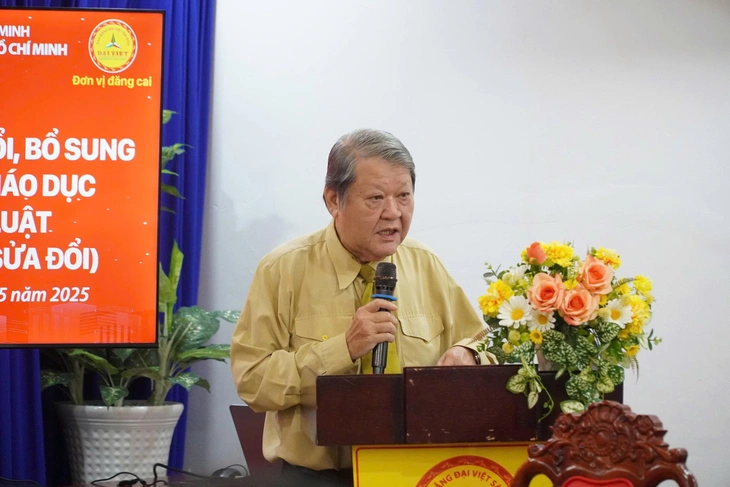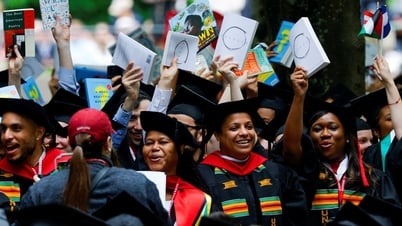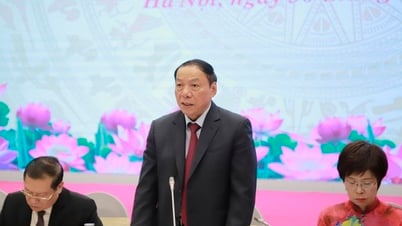
Mr. Tran Anh Tuan believes that it is necessary to clearly distinguish the value of "vocational secondary school" degrees - Photo: TRONG NHAN
Many opinions on 'vocational secondary schools' were raised at the workshop to contribute ideas to the draft law amending and supplementing a number of articles of theEducation Law and policies of the Law on Vocational Education (amended), organized by the Ho Chi Minh City Vocational Education Association on the morning of May 29.
The workshop took place in the context that the Ministry of Education and Training is developing the Law on Vocational Education (amended), while the draft Law on Education (amended) is also being widely consulted by the Ministry of Education and Training.
How valuable is a 'vocational high school' diploma?
Currently, the draft revised Law on Education proposes to remove the concept of "junior college" and replace it with "vocational secondary school", while adding vocational secondary school as a level of education in the national education system.
Accordingly, after completing grade 9, students will have three options: high school, vocational high school with an elementary certificate, or vocational high school with an intermediate vocational certificate. The vocational high school program will integrate general cultural knowledge and vocational skills, aiming to reach elementary or intermediate level.
Mr. Tran Anh Tuan, vice president of the Ho Chi Minh City Vocational Education Association, said that "vocational secondary schools" should not only include current secondary schools, as a way to change the name.
Instead, the current vocational education centers, continuing education centers and secondary schools should be merged into "vocational secondary schools".
Because according to him, reality shows that secondary schools are now linked to continuing education, and vice versa. Or looking at the tuition exemption policy, if students are exempted from tuition fees at secondary schools, they will usually pay for continuing education, and if they are exempted from tuition fees at continuing education, they will pay for secondary schools.
Therefore, he believes that it is advisable to merge to bring about real effectiveness. According to him, "vocational secondary school" will integrate vocational knowledge and high school curriculum, which is a form of specialized vocational training, focusing on equipping practical skills and specialized knowledge, suitable for the dynamic requirements of the modern working environment.
In particular, he said that the thing that schools recommended the most was that the law should clearly define the value of a vocational secondary school diploma. Is this diploma as valuable as a high school diploma, is it valuable for transferring to university, or should we continue to distinguish between vocational secondary school diplomas and high school diplomas as is currently the case?
"In my opinion, this is the factor that determines the value of vocational training, not how to name or arrange the vocational education system to be reasonable or streamlined," said Mr. Tuan.
Ms. Hong Thi Thanh Thuy - Vice Principal of Ho Chi Minh City Vocational College - shared the story of students being "discriminated" when receiving their secondary school diplomas and certificates. Previously, students had certificates of completion of general education, which were considered "equivalent" to high school diplomas.
However, when graduating and applying for jobs with this certificate, some agencies did not accept it. Later, the school shifted to linking with regular education systems to train cultural programs, helping students to receive an official high school diploma instead of an equivalent certificate.
Ms. Thuy believes that the upcoming Law on Education (amended) and Law on Vocational Education (amended) will have very clear regulations on the value of diplomas, especially vocational secondary school diplomas, to ensure the rights of learners.

Students studying at Saigontourist College of Tourism and Hospitality - Photo: THAO TRAN
Should there be an Education Act?
Mr. Dang Minh Su - Standing Member of the Ho Chi Minh City Vocational Education Association - said that it is necessary to consider amending the Law on Education in the direction of regulating a comprehensive framework, covering general education, vocational education and higher education, to ensure a unified, open, interconnected national education system and lifelong learning.
For example, the Law on Vocational Education could become a specialized law, under the framework law of the Law on Education, with the contents clearly regulated in a separate chapter on vocational education.
In addition, he said it is necessary to clearly define the state management role among ministries; encourage the establishment of a single focal agency or coordination mechanism to unify the management of education - training - vocational training.
Vocational secondary school programs should be regulated as a legal form of the national education system, with output standards, national diplomas and the right to transfer to colleges and universities.
Meanwhile, Mr. Le Lam, principal of Dai Viet Saigon College, expressed the view that laws related to education, including the Law on Education, the Law on Higher Education and the Law on Vocational Education, should be integrated into a unified set of laws, which can be called the Education Code.
According to him, the merger will help create links between regulations, especially in the current context when the focal point for education and training management has been transferred to the Ministry of Education and Training, facilitating coordination and policy implementation.
Source: https://tuoitre.vn/bo-trung-cap-thay-bang-trung-hoc-nghe-can-lam-ro-gia-tri-van-bang-2025052913180914.htm


![[Photo] General Secretary To Lam receives Chief of the Central Office of the Lao People's Revolutionary Party](https://vphoto.vietnam.vn/thumb/1200x675/vietnam/resource/IMAGE/2025/5/30/140435f4b39d4599a3d17975dfb444c5)
![[Photo] Journalists moved to tears at the Memorial Service for the soldiers who died in Gac Ma](https://vphoto.vietnam.vn/thumb/1200x675/vietnam/resource/IMAGE/2025/5/30/9454613a55c54c16bf8c0efa51883456)

![[Photo] A delegation of 100 journalists from the Vietnam Journalists Association visits the soldiers and people of Truong Sa island district.](https://vphoto.vietnam.vn/thumb/1200x675/vietnam/resource/IMAGE/2025/5/30/0984a986227d4e988177f560d2e1563e)

![[Photo] National Conference "100 years of Vietnamese Revolutionary Press accompanying the glorious cause of the Party and the nation"](https://vphoto.vietnam.vn/thumb/1200x675/vietnam/resource/IMAGE/2025/5/30/1cf6cd5c8a934ebfa347028dcb08358c)

![[Video] Announcing the score distribution of the 2025 HSA Competency Assessment exam](https://vphoto.vietnam.vn/thumb/402x226/vietnam/resource/IMAGE/2025/5/30/8f7b551d1e854f02a1873dcbf7f7a9ef)















































































Comment (0)